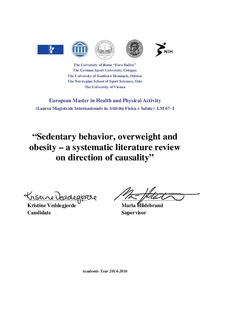| dc.description.abstract | Background: Sedentary behavior has emerged as a new field of science, whereas it has been
associated with several health problems such as obesity, independent of level of physical
activity. However, it is unclear whether sedentary behavior is a cause or a result of
overweight or obesity, or vice versa. To date, there is no review of prospective studies that
systematically examine this relationship
Objective: To provide a systematic literature review of the existing literature of prospective
populations-based studies investigating the bidirectional relationship between sedentary
behavior and overweight and obesity among non-patient children to middle-aged adults, and
to consider the directions of this causality
Method: This systematic literature review was conducted according to the PRISMA
guideline, and searches were performed in four different databases; PsycINFO, EMBASE,
PubMED and Web of Science, with search terms covering sedentary behavior and overweight
and obesity.
Results: Out of 23,452 articles, 161 articles were assessed for eligibility, and 10 studies were
included in the final sample. Most of the studies included children ≤11 years old at baseline
(n=4) or adults (n=4). Six studies use self-reported sedentary behavior, while the remaining
four studies used objective measurements. Whether baseline weight was associated with
change in sedentary behavior over time, four studies found no association, while one study
found an unfavorable association in second half of the study, and five studies found an
adverse association. Whether baseline sedentary behavior was associated with weight gain
over time, seven studies found no association, while one study found mixed associations
(between various exposure- and outcome variables), and two studies found an adverse
association.
Conclusion: Current evidence suggests that baseline weight predicts later sedentary
behavior, and that the evidence regarding a reverse- or bidirectional relationship to date is not
of sufficient quality to determined such relationship. Future well-conducted prospective
studies are therefore warranted to increase knowledge in this field as well as to enhance
heath-promoting strategies. | nb_NO |
